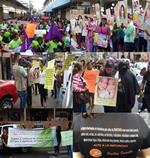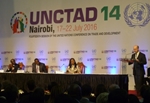Published on Thu, 2016-08-04 15:16
The ILO Social Protection Floors Recommendation No. 202, unanimously adopted by 184 members of the International Labour Conference in 2012, provided for the first time concrete content to the abstract right to social security. Recommendation 202 was born out of a desire to protect the vulnerable from the consequences of the Global Financial Crisis (GFC). It was one of the nine UN crisis initiatives agreed upon between the heads of all UN agencies in April 2009, time by when it had become obvious that, barring decisive action, ultimately the poor, the sick and disabled, the old and the unemployed would have to bear the lion’s share of the economic burden unleashed by the crisis. But, perhaps unintendedly, it helped define the right to social security, carrying important consequences for financial and fiscal policy. |
Published on Thu, 2016-08-04 15:08
From 11-20 July 2016, the 2016 meeting of the High-Level Political Forum on Sustainable Development (HLPF) took place at UN Headquarters in New York. Under the auspices of the UN Economic and Social Council (ECOSOC), the meeting focused on the theme of “Ensuring that no one is left behind.” It was attended by nearly 1500 Member States, Major Groups and other stakeholders (MGoS), and intergovernmental and UN organizations. In addition to the official program, 37 side events were organized. According to the Rio+20 outcome document and G. A. Resolution 67/290, the HLPF has the mandate to follow-up and review the 2030 Agenda for Sustainable Development and the Sustainable Development Goals (SDGs). Since this was the first meeting after the adoption of the SDGs, 22 countries offered voluntary reviews to the implementation of the goals, focusing mostly on how countries are preparing for and managing their transition towards the implementation of the 2030 Agenda. |
Published on Sat, 2016-07-30 12:23
In September 2015, Belgium declared that the 2030 Agenda will give a new élan for Belgian global engagement, calling for human rights, LGBT rights, women's rights, decent work and the power of digitalization, concluding that Belgium was ready to implement the agenda. However, by referring mainly to international cooperation, it was not clear if Belgium accepted the challenge to also change its national policy in order to reach the 2030 Agenda. A national strategy framework is to be established by September 2016 involving all levels of government, under the auspices of the Inter-Ministerial Conference for Sustainable Development, which is best suited to ensure a coherent strategy among the three regions and the federal government. Nevertheless, midway into the first year of implementation, the policy actions needed remain distant. Belgian civil society organizations demand and urgent and clear response to the challenges of this ambitious universal 2030 Agenda, and to commit to develop an integrated, overarching strategy covering internal and external affairs. |
Published on Sat, 2016-07-30 12:21
Honduras has committed itself to implementing the 2030 Agenda and this commitment is essential to overcoming the pervasive violence in the country. Honduras has the highest level of economic inequality in Latin America and is listed as the most violent of all countries that are not in a war situation. Women's lives are particularly at risk, which means that achieving gender equality and empowering all women and girls by 2030, as mandated by SDG 5, will be a major challenge. More than 18,000 women and girls reported suffering sexual violence between 2010 and 2015, but in less than 6 percent of the cases have perpetrators been condemned. Implementing the SDGs requires political and the reallocation of resources currently devoted to re-militarization, it is clear that human rights are not the priority. Only if social organizations, with the support of the international community, encourage compliance may the situation of the Honduran people improve. |
Published on Fri, 2016-07-29 09:59
Due to UNCTAD’s decidedly pro-South and uncompromising development-focused mission, its quadrennial conferences have traditionally been North –South showdowns. Coming a few months after the adoption of the ambitious and universal 2030 Agenda for Sustainable Development and its 17 associated goals, the theme of the XIV Quadrennial Conference of UNCTAD (the United Nations Conference on Trade and Development) was “From Decisions to Actions.” There was, therefore, reason to expect that this time members would bridge their differences for the sake of reinforcing mandates of the organization critical to the Agenda’s implementation. But that was not the case, and the dynamics were a lot more akin to the difficult ones witnessed in the inaugural Financing for Development (FFD) Forum last April. |
SUSCRIBE TO OUR NEWSLETTER







